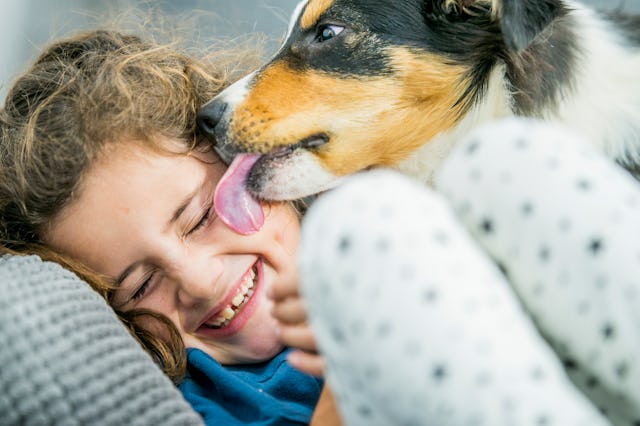I Put a Puppy-Sized Band-Aid On My Family’s Grief & I Am Not Sorry At All
Is getting a dog a good idea when you are mourning? Yes, yes it is.

I was writing my brother-in-law's obituary when I got to the part about family members who'd preceded him in death. Steve, my brother-in-law, had died unexpectedly the week before, and our family was reeling. As I typed out the name of his father, I couldn't help but include the animals Steve had also loved and lost. They were central to his life, part of his story.
There was nothing I could do to shield my son from the reality of death. I couldn't banish the aching grief that was now a part of our family, the invisible guest who sat at the table where Steve should have been. I could not bring back my husband's best friend or my mother-in-law's child. What I could do, though, was distract us with a puppy.
Puppies are adorable, yes, but they are also a lot of work, so I'm not going to list the ways our lives have gotten easier. There's pee on the floor, heirlooms that have been chewed, and near-constant barking. There's the extra walk on an icy night when you just want to stay inside. Puppies cause chaos. It's a lot.
But it's helping.
Sonja Harris, a grief and transitions coach, told me, "Pets help their humans feel a sense of purpose. It's completely normal to stop caring about, well, anything when you're grieving. Even getting out of bed is too much some days. But pets have needs that can't be ignored."
Ever tried to ignore a puppy? Between the cuteness and the mayhem, it's impossible. Don't want to get out of bed? Too bad — the puppy needs to go out.
"Taking care of a pet gives a grieving person something to focus on other than their own pain and can give them a reason to keep going even when they don't want to," Harris says.
The sudden death of a close family member kicked part of the foundation out from under our family. As anyone who has experienced this can attest, the list of ordinary things you thought you were going to do — work, school, apple picking, hockey tryouts — is replaced by a shorter, much harder-to-get-through list. Funeral plans, eating, waking up.
As time marches on, the discoveries of loss are daily: things like not being able to give them a quick call or text a stupid meme. A song or a poem you read invokes them.
Jennifer Kelman, LCSW and mental health expert on JustAnswer, shared something with me that felt right on the nose. "Often, people feel they need to rush through their grief in order to satisfy others and their timelines around grief," she tells me. "This can cause pressure, stress, and additional anxiety after the loss. But pets don't give that pressure. They love unconditionally and never judge how you feel."
There's a "get back to normal" myth we can fall victim to as a person in mourning. And sometimes this can make us feel even more lost. But you know who doesn't mind if you cry on the couch in the middle of the day? A puppy.
As Harris reiterates, "Pets don't judge. They don't care if you haven't had a shower this week and have left the dishes in the sink for even longer. They won't ever tell you to get over it or move on or that it's better to have loved and lost … They love you no matter how many days you've worn your favorite sweats with the coffee stain on the front. Pets don't judge you; they're a steady, accepting presence at a time when life is unsteady."
I'm not saying a puppy is the cure-all. But bringing a soft, adorable dog who wants nothing more than your approval, love, pets, and food, in many ways, simplifies things. Yes, it's messy and challenging, but it also puts something in front of you that pulls you forward. And Steve would have loved that.
This article was originally published on